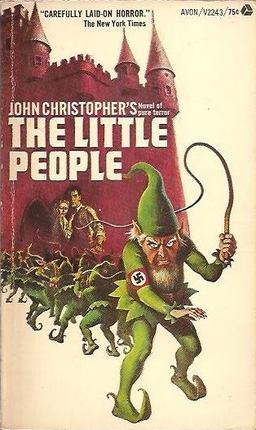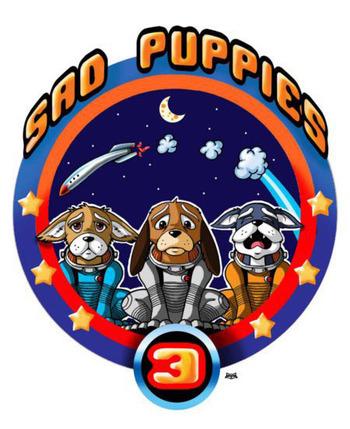The Proxy Culture War for the Soul of Middle Earth
 The culture war has been going on for a while. We’re used to it played out large. Trying to boil down 50 years of social history and politics into a paragraph is going to lose some nuance but, in broad strokes, you’ve people for whom established mores work, usually from homogenous communities, and people for whom they don’t — who are frequently labeled with various flavors of moral degeneracy. Usually to the scorn of history.
The culture war has been going on for a while. We’re used to it played out large. Trying to boil down 50 years of social history and politics into a paragraph is going to lose some nuance but, in broad strokes, you’ve people for whom established mores work, usually from homogenous communities, and people for whom they don’t — who are frequently labeled with various flavors of moral degeneracy. Usually to the scorn of history.
It’s played out in government, often in schools. We’re used to that. But now it’s also playing out in our fandom, our games, our conventions. This year the Hugo Awards took some collateral damage from being a battlefield in a war that is part of that narrative but is also somewhat removed from how we’ve been used to thinking of this fight.
Safe Space and the Geek Social Fallacy
There is a social movement of, largely, white male nerds misusing the concept of safe space to exclude people from geekdom.
Safe space is an area where anyone can be comfortable in who they are without recrimination, without bullying and without threat.
Most of our society isn’t safe. The litany of violence, abuse, and microaggression thrown at people because of fundamental aspects of their person is well documented
Spaces have gatekeepers: editors, convention directors, marketing executives, investors. People who you need to go through in order to put something in space.
 Most gatekeepers are still men, still white, are disproportionately heterosexual and their decisions on gatekeeping are informed by their own experience and prejudices. This is a pretty major reason why most of our society isn’t safe.
Most gatekeepers are still men, still white, are disproportionately heterosexual and their decisions on gatekeeping are informed by their own experience and prejudices. This is a pretty major reason why most of our society isn’t safe.
This isn’t to cast aspersions on any of these people. With even the most honorable intentions it’s barely possible to see the space one gatekeeps from perspectives that aren’t one’s own.
The Geek Social Fallacy states that that geekdom — Sci-fi, Fantasy, gaming, comic books, computers — exists to provide a cultural space in which it is safe to be a geek, a weirdo and that a fundamental part of that is that these spaces need to be free of mainstream cultural judgments for that reason.
The most articulate and sympathetic presentation of it that I know of is here.
For a lot of default white male nerds that means safe for them and hostile to everyone else. Safe to leer, and grope at other attendees; safe to dominate space with homophobic or racist slurs; safe to objectify and remain unaccountable.
A not-entirely-cis (her gender identity isn’t entirely consistent with her declared birth sex) queer woman (and very much a weirdo) friend of mine put it, along with a lot of the conflict, pretty succinctly:
When I wanted to join those weirdos they kicked me to the curb because I wasn’t one of them. So yes, now I have new friends and sure, some of those friends look more normal than that lot. But they accepted me.
This isn’t to say that space where people who are weirdos can be weirdos isn’t valid or valuable. Just that if those spaces exclude other weirdos because of other aspects of their person then that’s a bit smelly.
The Rise of the Internet Natives
 We live in sci-fi times. The internet has irrevocably and fundamentally changed our social structures and we don’t even really know what that looks like yet, let alone what it means.
We live in sci-fi times. The internet has irrevocably and fundamentally changed our social structures and we don’t even really know what that looks like yet, let alone what it means.
The Digital Natives are reaching their mid 20s. Those hitting their 30s may not have always known the internet but know it well enough to make little difference. These people are reaching the stage in life where they get to be a big part of deciding what the world looks like and those in their way are on the downward slope.
Many internet natives draw identity straight from their online subcultures. Much like the nationalism of the past.
When we talk about Social Justice Warriors (SJWs), or Men’s Rights Activists, or Gamergate, or even Sad Puppies, we’re not just talking about ideology. We’re talking about identity. Fandom groups are part of this phenomenon, making it all the more complicated.
The Internet short circuits the social barriers of meat space. Historically the identity of the hetero white male nerd has been something of a self fulfilling prophecy. Access to the world of geekdom being policed and populated — gatekept — by members of this very specific group created the perception that geekdom is theirs.
The global intangibility of the internet has allowed nerds that don’t fit that picture to find each other, disprove that perception, and enabled them to decide what to do about it.
A meaningfully expanded social discourse beyond the hands of those who already have amassed social capital. Solutions to social problems no longer have to preserve existing social privilege to anywhere near the same extent to be seen as credible and viable and to gain momentum.
First wave feminism was driven by the requirements of the wives of middle class men because they made up its leadership. Today’s discourse on tomorrow is built sideways to established social structure in a way that wasn’t possible prior to the internet.
MRAs and MRA Adjacent

Organizers of Edinburgh’s, apparently now world famous, Beltane Fire festival use the term “Hippies and Hippie adjacent.” It’s a flippant recognition that while not everyone involved fully identifies with the hippy label, in that context, it’s a deeply hippie thing that is being done and it’s being done with hippieness firmly at the core.
There were a lot of supporters of Gamergate who didn’t express particularly inflammatory opinions or engage in particularly harassing behavior, who probably wouldn’t want to identify with the Men’s Rights Activists (MRA) label.
That doesn’t change what Gamergate was. It doesn’t change its context or the social politics at its core. It doesn’t change who those people decided to make allies of.
In geekdom we often like to maintain an intellectual distance, to not pick a side, and to give people the respect of assuming an argument in good faith. Often this causes us to overlook that things are sometimes part of movements and can’t really be considered in isolation from them.
This, in turn, supports veneers of respectability which hide things that are considerably darker.
We Have Our Own Money and We’ll Pay for That, Goddamnit!
Geekdom is really important to a lot of young women and they have the money to make that stick.
The new normal isn’t for a young woman’s income to be a minor contribution to a household but for it to be significant and her own to dispose of as she choses. However, while it has become more normal for young women to have jobs, good jobs, real jobs… it has become harder to afford the fundamental pillars of a middle class lifestyle. Education is expensive. Home ownership is expensive. Healthcare (where it’s not socialised) is expensive.
Comic books, novels, video streaming and movie tickets are relatively cheap. Most internet natives feel they will never be able to afford safety, security, and a family. They know they can, however, afford all the fun.
So, a significant number of women are prepared to lay down real cash monies for media in which female characters are treated the way they would like them to be. This is knocking the received wisdom of marketing geekdom on its ass and sending our default geekboys into fits of…
Privilege Distress and the Proxy in the Proxy War
 Privilege distress is better defined here than anything I can manage. For those who aren’t going to read another article: privilege distress is the feeling of unease felt by people who are having injustice that works in their favor re-addressed.
Privilege distress is better defined here than anything I can manage. For those who aren’t going to read another article: privilege distress is the feeling of unease felt by people who are having injustice that works in their favor re-addressed.
It’s a permanent fixture in the culture war, and most political discourse. There’s a reason that Republicans play well with white men and Democrats play well with women and members of racial minorities. That reason is that the broad strokes of the culture war are whether we want a society which favors those it favors, or whether we want one which works for everyone.
One of the major fronts of the culture war in the age of the Internet Native is the ongoing clash between the Social Justice (SJ) movement and the self-proclaimed Men’s Rights Activists (MRAs). Media is a pretty big part of that front because it’s a major principle of the overarching SJ philosophy that culture is important and shapes the rest of society.
SJ activists want geekdom (along with the rest of society) to be a safe, inclusive space.
The MRAs don’t think there is a problem and look upon attempts to change our culture with suspicion and hostility.
To MRA’s, the fact that women have buying power in the media sphere and people have ways of having social discourse that doesn’t pander to white maleness is a threat. This isn’t just ideology. It’s also identity.
I mention the Republicans because Correia did. Because he flat-out crowed that the vandalization of the Hugos was an act of red state, culture war, privilege distress and he linked it to the gamer movement which responded to mild criticism of some video games with death threats, the leaking of personal information, and a threat to shoot up a university.
The proxy part is where this intersects with geekdom. One of the unfortunate shared experiences of most geeks is bullying. Most geeks feel outside of social normality because they’ve been put there by other people. The trauma carried by a lot of geeks surrounding this is very real and very unfortunate.
It’s also true that, in a lot of ways, the SJ philosophy is born of an intellectual liberalism; that its adherents go beyond geekdom; that it can often take a snooty, condescending tone; that outrage is certainly in its playbook; that problematic parts of geekdom can be caricatured in ways that are reminiscent of the bullying faced by a lot of white male geeks.
 This makes it very easy for the places where the MRAs meet geekdom to paint the places where the SJ activists meet geekdom as judgmental, insurgent, outsiders intent on stripping away their solace and condemning them for the unforgivable sin of being a weirdo. To tie that white male geek identity with an antipathy to SJ activists as a group rather than engaging with the issues which are actually being fought over.
This makes it very easy for the places where the MRAs meet geekdom to paint the places where the SJ activists meet geekdom as judgmental, insurgent, outsiders intent on stripping away their solace and condemning them for the unforgivable sin of being a weirdo. To tie that white male geek identity with an antipathy to SJ activists as a group rather than engaging with the issues which are actually being fought over.
Sad Puppies and Gamergate are attempts at gatekeeping for the old order. Attempts to keep out the things that people who aren’t white and male want in their space; attempts to keep people who aren’t white and male out of their space.
When Correia talks about how votes are based on identity rather than quality of writing he’s invalidating the notion that characters and stories that speak to people who aren’t like him are legitimate preferences for his fellow fans.
When he talks of a liberal elite he’s invoking a tactic used by names that don’t belong in a reasoned perspective on anything; used to make a virtue of doing something that smart people have a problem with.
That gatekeeping is being attempted by pitting geek against geek; by defining geekdom as a space without room for diversity; by invalidating the very existence of fans who aren’t like him. We’ve seen this with computer games. We’ve seen it with comics. Where economics and technology and social progress have exposed and provided space for genre fans who don’t fit the mold set by decades of social blinkering they have been denounced by people who see this as a threat.
Puppygate is not a benign, isolated event which can be sufficiently assessed with reference only to itself, the Hugos, or science fiction. It’s a point in a fight between a movement and countermovement both tied to and distinct from the same fight we’ve been having for decades, a fight that has decided that our hobbies are not now, if they ever were, sacred ground.
While this sucks, it’s not a bad idea to keep in mind what it is that everyone is actually after.
Sandy Ryalls has been involved in the organisation of games conventions for ~8 years, has lived between various counter-culture groups for a decade and has a keen interest in geek culture and social dynamics. He is a member of the Scottish Green Party and would describe his political identity as Edinburgh Liberal.
2 thoughts on “The Proxy Culture War for the Soul of Middle Earth”